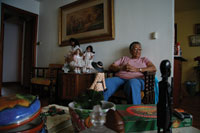By Danielle Marsh
Lincolnville resident Janie Price remembers a lot about the civil rights struggle in St. Augustine.
“I had my car flipped over,” Price, 80, said. She says it was done out of spite because she was a participant in several sit-ins and marches here in St. Augustine. Price responded to this act by telling others that she was, “going to ride all over town and let them see it to let them know they didn’t frighten me.”
 Video
Video
 Photo Gallery
Photo Gallery
For something that is personal history for longtime residents like Price, the rich black history of St. Augustine has become a faded backdrop to the newer locals.
Many Flagler students live in Lincolnville and are relatively close to sites that are landmarks of the civil rights struggle, but do not value them as much as Price and her generation do. Senior Michelle Christena lives in Lincolnville and has to walk by some historically significant places every day, but says it’s not at the forefront of her mind.
“It’s pretty much daily life blended into the background,” Christena said.
But the reality is several famous African Americans such as the Rev. Martin Luther King, Jr., writer Zora Neale Hurston and photographer Richard Twine walked the streets only blocks from Flagler College. Many places like Price’s home on M. L. King Avenue and the old Woolworth’s Building in the Plaza go unnoticed by locals and casual tourists.
During the 1960s, Price hosted King when he visited St. Augustine to speak out against the unjust treatment of blacks. Recalling a conversation Price had with King, she asked him, “Are you afraid?” He said, “No. I’m not afraid to die because if something is not worth dying for, it’s not worth doing.”
Some of these places are decaying, falling apart or have been destroyed completely. The Woolworth’s building, where sit-ins were held at the lunch counter, is now a souvenir and T-shirt shop. A good number of these places, like Price’s home, have markers signifying their importance, but others do not.
Activists like local historian David Nolan have made several efforts to draw attention to these places. However, they wonder when they leave, who will carry on the task of documenting these places and trying to preserve them.
“People get old, and people forget, and people die,” Nolan said. “This is really the time we should be focusing on this.”
Price wants younger people to do this. “It’s time for us to stop dealing with the past, and to start looking towards the future because our children are our future and they’re not doing anything about it,” Price said.



Be the first to comment on "Lincolnville’s history not well known to students"